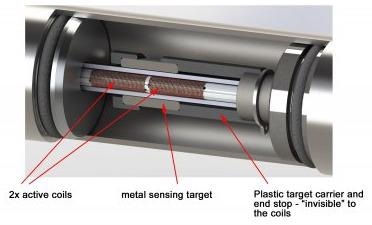When a major UK-based structural health monitoring systems company were called in to urgently evaluate problematic expansion joints on a reinforced concrete motorway bridge, they required not just an extremely fast delivered solution for several linear displacement sensors but also a combined accuracy, temperature stability and environmental specification that would be beyond the capabilities of most suppliers.
 Cutaway view of Positek’s differential coil design – provides higher accuracy and lower temperature drift. Image Credit: Positek Limited
Cutaway view of Positek’s differential coil design – provides higher accuracy and lower temperature drift. Image Credit: Positek Limited
Compounded by such restraints they contacted Positek Limited who pulled out the stops and within a one-week timescale delivered around forty custom-built sensors featuring a unique differential coil design with electronic temperature compensation and full IP68 protection. Based on Positek’s PIPS™ non-contacting sensor technology – a compelling alternative to LVDT and potentiometric displacement sensors – the long life and exceptionally durable sensors deliver consistently high accuracy linear position measurement in the harshest environments.
The expansion gap on a typical road bridge is expected to linearly expand and contract around 1 mm over a temperature range of -20 to +35 °C. In order to precisely monitor abnormal non-linear gap movement in both vertical and horizontal planes and in real time, the overall accuracy offered by the sensor’s had to be excellent. Due to mechanical expansion as well as a temperature shift in the sensor electronics, it was decided to custom modify the standard coil design of Positek’s S115 series linear displacement sensor and integrate thermal drift compensation to boost precision and temperature stability.
The standard PIPS coil design features a fixed reference coil, an active coil and a one-piece metal target. The custom modification introduces a second active coil in place of the reference coil with a metal target spanning both coils. This differential layout was further enhanced by modelling the sensor’s thermal coefficient and factoring the values into temperature compensation electronics that was integrated into main housing. Sensors with a 5 mm displacement range were supplied for the application and arranged vertically and horizontally on brackets supplied by the customer. The modified design can be supplied with displacement ranges as low as 1 mm. As well as improve the measurement linearity over the temperature range, the modification also increased the gain by a factor of three and reduced the electrical noise by two- to three-times – which was of benefit for the multiple measurement instrumentation system the customer developed for the application.
Positek’s linear displacement sensors, even as standard components, offer environmental ratings up-to and exceeding IP68 protection levels and 10-bar submersible pressure endurance. The 35 mm diameter push-rod sensor used for this challenging measurement task was housed in 316 stainless steel and fully sealed to protect the sensor electronics against rain, road salt and sea water corrosion as well as the potential for frosts and high-humidity. The durable sensors also impress with standard shock and vibration specification values of 10g (IEC 68-2-6) and 40g (IEC 68-2-29) respectively. As with the standard PIPS technology design, this custom differential model is contactless and offers extremely long working life.
For this application, the custom sensors included industry standard 4…20 mA outputs with continuous proportional and absolute output with no need for additional signal conditioning. M8 rod-eye bearing fixings and cable gland/flying lead electrical connections facilitated straightforward commissioning. Positek’s linear displacement sensors are also available in a wide choice standard electrical outputs with various electrical connection options and calibrated output-to-length ratios.
Positek successfully manufactured and delivered the fully requested quantity of customised displacement sensors within the one-week timescale required by the customer to accommodate a scheduled maintenance closure of the motorway bridge.